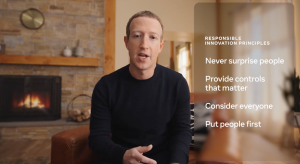 Lecturer in Digital Marketing at the University of Bristol Business School, Dr Ana Javornik, explores the Metaverse announcement – but is it a good idea?
Lecturer in Digital Marketing at the University of Bristol Business School, Dr Ana Javornik, explores the Metaverse announcement – but is it a good idea?
There has been a lot of negative reaction to Mark Zuckerberg’s presentation on Metaverse and much of that criticism is understandable. But there is also a lot to be excited about. I wished to offer an attempt to a balanced reflection.
The experiences that Meta is building via horizon spaces and mixed realities can be entertaining, visually appealing, very immersive and in certain aspects very beneficial. It can potentially allow people to do meaningful things that they weren’t able to do before or do them better (collaborate better, be more creative, express themselves better, optimise processes, connect more easily and so on). We should try to make the most of the technological opportunities for the betterment of humankind and planet.
 For that to happen, the driving force behind these innovations needs to be clear. There needs to be a convincing case that new technologies permit us doing a certain task better than we do it now in a physical world or with existing technologies. Tech enthusiasts can get very excited about the sheer possibilities of technology, sometimes without thinking what human needs it serves. It should always be the other way around. The right question to ask is not “Could we?”. Rather, it is – “Should we?”. For that to happen, tech developers need to continuously engage with those that see technologies more broadly – human-computer interaction experts, sociologists, psychologists, anthropologists, economists and so on. Zuckerberg acknowledged the need for that in his presentation and briefly outlined how Meta would aim to achieve that. To which extent these intentions will be implemented remains to be seen.
For that to happen, the driving force behind these innovations needs to be clear. There needs to be a convincing case that new technologies permit us doing a certain task better than we do it now in a physical world or with existing technologies. Tech enthusiasts can get very excited about the sheer possibilities of technology, sometimes without thinking what human needs it serves. It should always be the other way around. The right question to ask is not “Could we?”. Rather, it is – “Should we?”. For that to happen, tech developers need to continuously engage with those that see technologies more broadly – human-computer interaction experts, sociologists, psychologists, anthropologists, economists and so on. Zuckerberg acknowledged the need for that in his presentation and briefly outlined how Meta would aim to achieve that. To which extent these intentions will be implemented remains to be seen.
The presentation depicts seamless transition across realities. It should make it clearer that these fully immersive experiences would require wearing a headset. While VR can be a very exciting tool in certain context, I find it hard to see how we will want to be wearing a headset when we exercise, socialise, work and so on. It might be a different story with AR glasses as they are likely to be more comfortable to wear and allow co-existence of virtual and physical. The presentation did a great job in offering a vision statement. But that also meant that sometimes it was unclear what devices and platforms would be required for these experiences to emerge. It was sometimes difficult to understand how these experiences would work – for instance, what is possible (and not) with teleporting. I needed a computer scientist to explain it to me better. I appreciate that Zuckerberg and his team aimed to make it accessible to a wide audience, thus not going into a nitty-gritty tech details, but some ideas were confusing in terms of how that would be achieved.
 One of the main problems of Mark Zuckerberg’s presentation might be, unfortunately, Mark Zuckerberg. I admire him for the disruptive innovation that he achieved, but I do not admire him for the damage that he caused in terms of privacy issues, social media addiction and mental well—being. Recent whistleblowing revealed that the company knew about some of the negative consequences their platform was causing but chose not to respond to them. While unintended consequences are par for the course with technological innovations, companies need to be able to respond to them, also to maintain or re-gain public trust. Unfortunately Facebook and Mark as its CEO has not done that in a convincing manner. That makes it hard for the public to get on board with their new vision, no matter how innovate it may be.
One of the main problems of Mark Zuckerberg’s presentation might be, unfortunately, Mark Zuckerberg. I admire him for the disruptive innovation that he achieved, but I do not admire him for the damage that he caused in terms of privacy issues, social media addiction and mental well—being. Recent whistleblowing revealed that the company knew about some of the negative consequences their platform was causing but chose not to respond to them. While unintended consequences are par for the course with technological innovations, companies need to be able to respond to them, also to maintain or re-gain public trust. Unfortunately Facebook and Mark as its CEO has not done that in a convincing manner. That makes it hard for the public to get on board with their new vision, no matter how innovate it may be.
Zuckerberg is proposing a new technological ecosystem. One could think of it as a new generation of “internet”. However, when Sir Tim Berners-Lee created WWW, he released it into the wild and let go of the control – it was not owned by anyone. That is clearly not going to be the case with Meta (or other similar systems that the competitors are building). The control over the system will be concentrated in the hands of one company which is ultimately governed by one person. This is problematic, given that we will dedicate a growing proportion of our lives, activities, identity etc. to these spaces, which will to some extent substitute our physical reality. Those creating and governing Meta are not democratically elected and formally guided by the principles public service, human well-being, transparency etc. Rather, the project is ultimately governed by the forces of the free-marking capitalism. This profit-driven approach has pushed Facebook to gulp users’ privacy to create increasingly more invasive personalised targeting or to build addictive features that make people spend more time on them. Even if Meta and Zuckerberg have the best intentions (?) of building platforms that connect people, profit-driven activities and the principles of what is better for the society will butt heads. When it comes to that, it is currently hard to see how Meta will choose the latter over the former, especially given its past behaviour. That does not mean that this is not a real opportunity to do things differently. All the parties – experts, end-users, governments, private companies – should commit to building and using the technology better and more responsibly and that “healthier” principles are the driving force from the start.
I would like to believe that change is possible. Meta would like to believe that it is possible. It is undeniable though that this is a huge challenge.
Find out more about Ana’s research.

